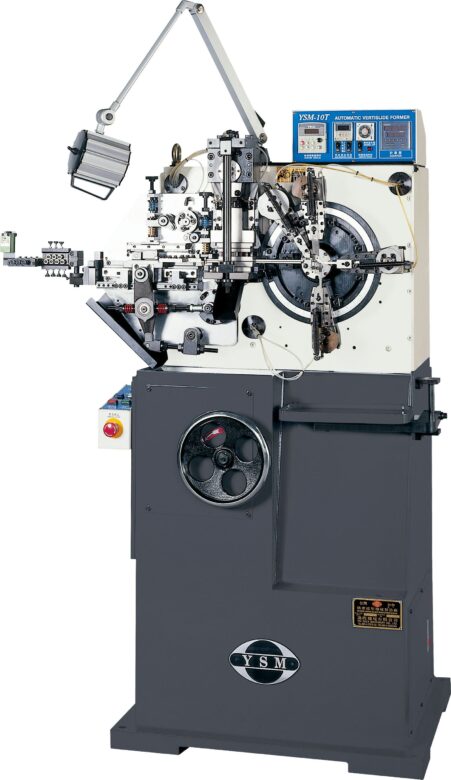YSM
Established in 1979 – YSM today has evolved into the Top 3 global leaders in providing Stamping and Bending manufacturing solutions. Our greatest asset is not just an effective workforce, but our well-trained and competent support team of over.

Four slide Forming in India

Four-slide forming is a specialized metal forming process that employs a four-slide machine to manufacture intricate and complex components. This method uses four horizontal slides to control tooling movements, allowing for precise bending, stamping, and shaping of materials like metal wire or strip. Four-slide forming is ideal for high-volume production, offering cost-effective and efficient solutions while maintaining tight tolerances and reducing the need for secondary operations. This versatile process is commonly used in industries like automotive, electronics, and hardware to produce various intricate parts and components.
Introduction to Four-Slide Forming
Four-slide forming is a highly efficient and versatile metalworking process that has found applications in various industries, including automotive, electronics, aerospace, and consumer goods. It is capable of producing intricate parts with multiple bends, twists, and features in a single operation, making it a cost-effective choice for high-volume production.
The Four-Slide Machine
At the core of the four-slide forming process is the multi-slide or four-slide machine. These machines are specifically designed to manipulate metal materials with precision and consistency. They come in various sizes and configurations to accommodate different part sizes and complexity levels.
A four-slide machine consists of four key moving components or slides: two forming slides and two auxiliary slides. Each slide is equipped with a set of tools, dies, and cams that control their movement. The machine operates by coordinating the synchronized movement of these four slides, allowing the material to undergo multiple shaping operations in a single pass.
Material Feeding and Tooling
Four-slide machines are compatible with a wide range of metal materials, including stainless steel, aluminum, brass, and copper. The material is typically supplied in the form of a coil or strip, which is fed into the machine through a precise feeding mechanism. The feeding mechanism ensures accurate advancement of the material, allowing it to pass through the various forming and cutting stations.
The tooling in a four-slide machine is crucial for shaping the material into the desired part. Each forming slide is equipped with a unique set of tools and dies, which are customized to the specific part design. These tools can perform operations such as bending, punching, cutting, and coining, depending on the requirements of the part being produced.
Operation Sequence
The operation of a four-slide machine follows a carefully choreographed sequence. As the material strip or wire is fed into the machine, it passes through the first forming slide, where the initial bending and shaping operations take place. The material then proceeds to the second forming slide, where additional forming actions occur. The auxiliary slides assist in providing support and stability during these operations.
One of the notable features of four-slide forming is the ability to create complex geometries and intricate shapes in a single pass. The coordinated movements of the slides, guided by the cams, allow for precise control over the material, ensuring that it conforms to the desired specifications. This level of precision is particularly valuable when producing parts with tight tolerances or complex designs.
Advantages of Four-Slide Forming
Four-slide forming offers several key advantages:
- Complex Part Geometry: It excels at producing parts with complex shapes, multiple bends, and intricate features.
- High Precision: The synchronized movements and precision tooling result in parts with tight tolerances and consistent quality.
- Efficiency: Four-slide machines are highly efficient, reducing cycle times and increasing production rates.
- Material Savings: Minimal material waste is generated, making it cost-effective for high-volume production.
- Versatility: Four-slide forming is suitable for a wide range of materials and can accommodate various part sizes and shapes.
Applications of Four-Slide Forming
Four-slide forming is widely used in numerous industries and applications, including:
- Automotive: Parts like brackets, clips, and connectors are often produced using four-slide forming.
- Electronics: It is used for manufacturing components like connectors, terminals, and contacts in electronic devices.
- Aerospace: The process is employed to create precise aerospace components such as fasteners and brackets.
- Consumer Goods: Items like zippers, fasteners, and hinges often rely on four-slide forming for their production.
- Medical Devices: Medical instruments and devices, including surgical instruments, can be manufactured using this technique.
Conclusion
Four-slide forming is a sophisticated metalworking process that allows manufacturers to create complex and precise parts efficiently and cost-effectively. With its ability to produce intricate geometries and maintain high precision, it continues to play a vital role in meeting the demands of various industries for high-quality, custom metal components. As technology advances, four-slide machines become even more capable, enabling the production of increasingly intricate and innovative designs.